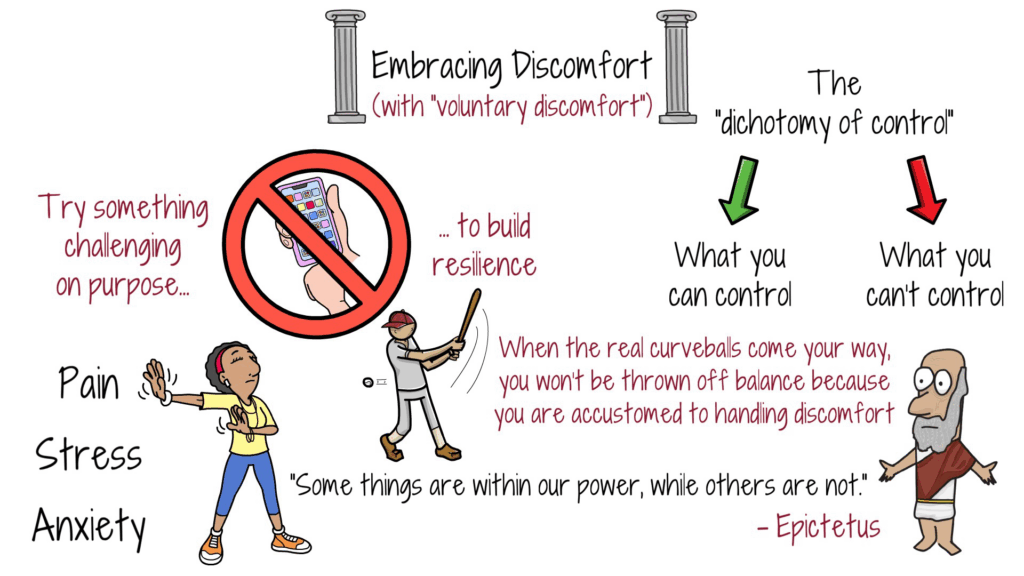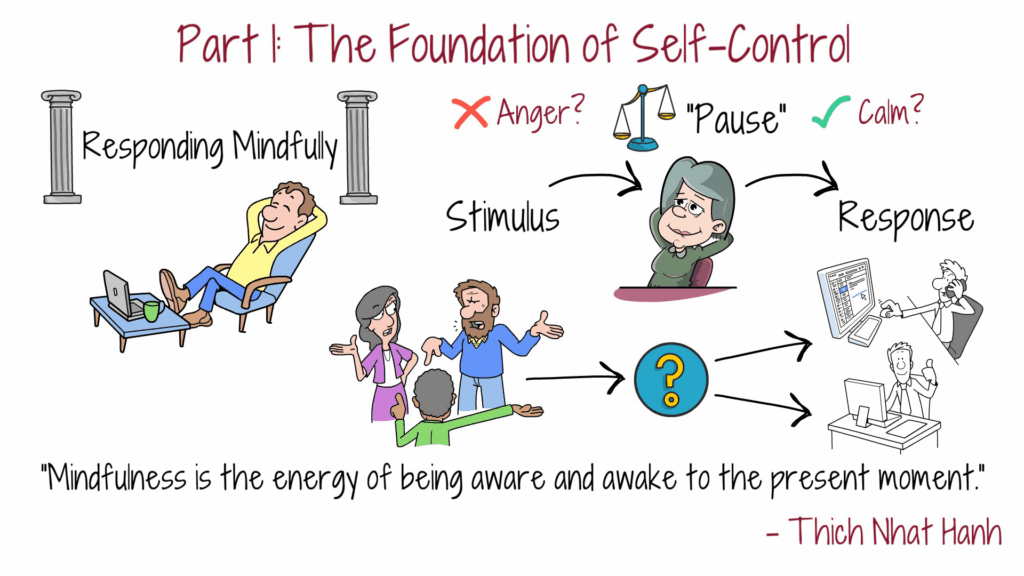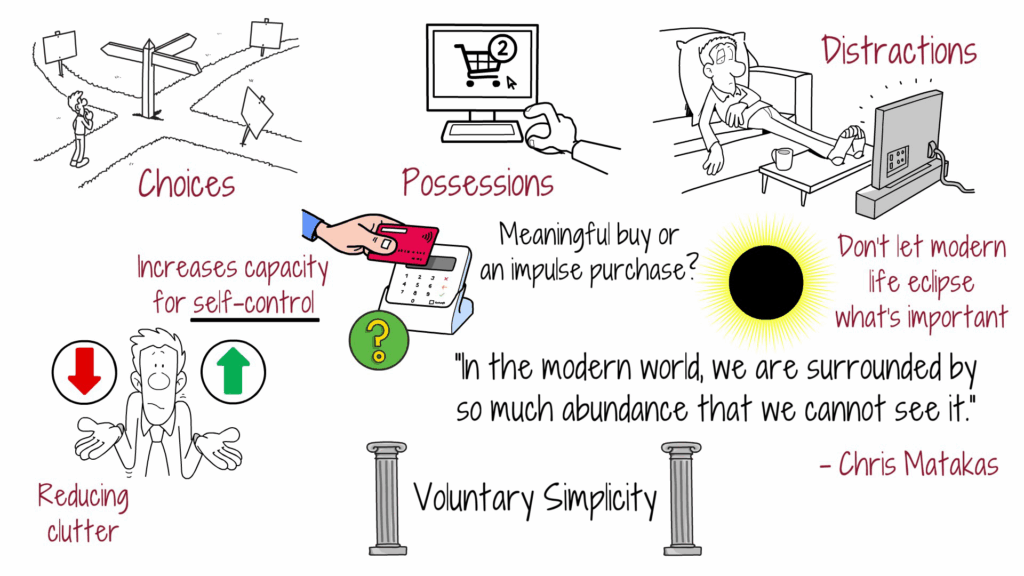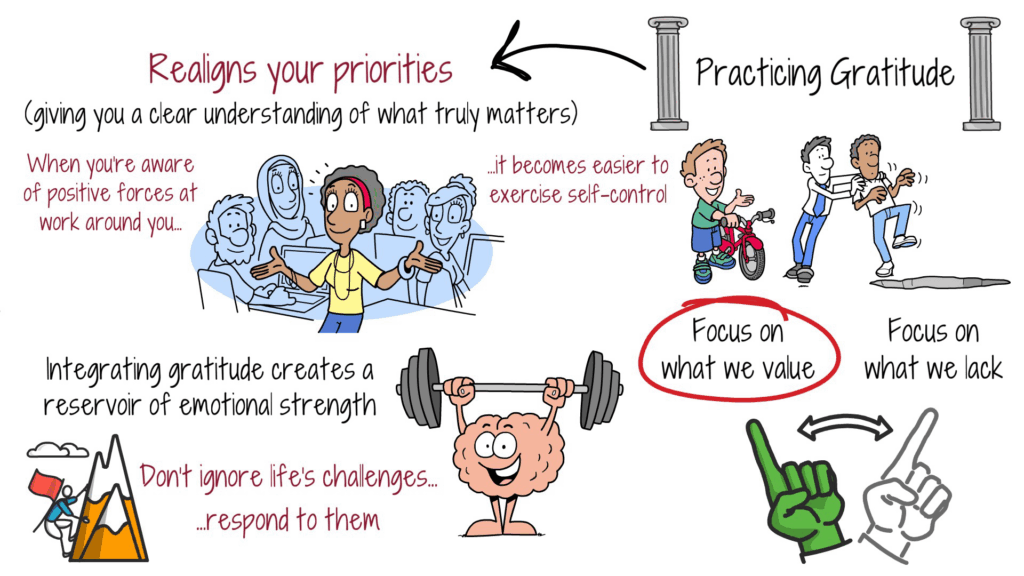Have you ever known someone who had an admirable sense of self-control?
No matter what the situation, they always seemed to know what to say or what action to take.
Not having self-control can feel just the opposite. Over indulgence or saying something without thinking inevitably can cause unwanted circumstances. But how do you get to that point of making choices based on intentional words and actions?
What qualities could help you to become an expert at self-control?
Embrace Discomfort
Stoic philosopher Epictetus wrote,
“Some things are within our power, while others are not.”
Life can come at us in unexpected ways. How many times have you experienced tough situations that caught you off guard and threw everything into a tailspin? When you think about how much of it is under your control, you may realize that there’s only a few things that fall into that category. Basically, we can affect what we think, say, and do.

When dealing with all the other stuff, it could be helpful to be as ready as possible, to prepare ourselves for unknown situations. One thing to consider is that when unexpected circumstances occur, it’s likely you’re going to feel some discomfort. So how can you be ready for it?
Practicing “Voluntary Discomfort” can help you withstand the shock of life’s ups and downs, by preparing you for difficult situations. For example, going without certain luxuries temporarily can help you realize what you can do without. If the power goes out in your home, can you live without it? Try going without for a day and see what happens. Chances are you will find ways to cope and build confidence in your ability to get by.
When you accept situations where you are not in your comfort zone, you learn resilience and how to endure things. Then when something unexpected happens, you are better equipped to handle it with a calm sense of self-control.
Consider the “dichotomy of control.” Focus on what you can control and have equanimity over the rest. When you embrace discomfort, you can learn to have self-control with mental calmness, composure, and an even temperament.
Philosopher Seneca stated,
“We should voluntarily set aside a few days to subsist with little food, course clothing, and no material comforts. We should prepare for adversity, amidst the favors of fortune. Such practices of endurance will help us realize we can make do with very little. Vagaries of fortune won’t affect us.”
Respond Mindfully
Another facet of self-control is in how you manage your feelings and how you express them. What does it mean to be mindful? Zen Master and Author, Thich Nhat Hanh, defines mindfulness as, “…the energy of being aware and awake to the present moment.”

In this state of mind, you can be better prepared to make conscious decisions about how you want to act in any given situation. Author Eckhart Tolle concluded,
“When you recognize that there is a voice in your head that pretends to be you and never stops speaking, ..when you realize that you are not that voice but the one who is aware of it, you are free.”
Having self-control begins in observing and identifying your thoughts. Then you can choose how you want to respond to them. You can decide if you want to believe the thought, then choose whether you want to respond to it or delete it.
In between stimulus and response, there is a gap. It allows you to pause, think, and make a conscious choice as to what you want to do. This is the difference between reacting and responding. Self-control is choosing how you want to respond.
When processing your thoughts before blurting out a reply, you can be more in control of how the situation unfolds.
Voluntary Simplicity
Simplifying your life is another way to contribute to self-control. This isn’t about not having things. It’s about making conscious choices that make your life less complicated. When you purposefully scale down the things you have to manage, you have more time to manage the things that matter to you.

One way to develop voluntary simplicity is to check your indulgences and curb your impulses. For example, when you’re at a store, use your skills of present awareness and think about what you’re purchasing. Do you need it? Will it make your life more meaningful or efficient? Are you reacting to an inner impulse?
If something enhances your life, by all means consider the purchase wisely. Voluntary Simplicity does not leave you feeling a sense of lack or missing out on something important. It’s a sense of knowing what matters and considering quality over quantity.
Martial Arts Coach, Chris Matakas said,
“In the modern world, we are surrounded by so much abundance that we cannot see it.”
In the same way, the phrase, “You can’t see the forest for the trees”, implies that sometimes we have difficulty focusing on the important points when we are overwhelmed by everything else.
Having self-control over your actions and decisions could mean having a life filled with what you really want, and not filled with things or experiences that don’t align with your true goals and purpose.
Practice Gratitude
Having a practice of gratitude can be misunderstood. Most people might think the way to be grateful is to make a list of all the things you’re thankful for. True, it’s good to think about those things, like our many blessings, our loved ones, and our good fortune. But you might be surprised to know that observing other people receiving something can trigger our brains to feel that sense of happiness, even more than receiving something ourselves.

Maybe you have heard the phrase that it’s better to give than to receive. The reason for that idea lies in your medial prefrontal cortex. This part of your brain is located in the area of your forehead and one thing it’s responsible for is processing your experiences.
When you have the experience of feeling someone else’s gratitude, it triggers something in that part of the brain that makes you feel good. To say it another way, think of when you saw a child that you love, receiving a present. Or when you saw a video of someone in a difficult situation receiving the help they needed. You probably felt happiness for what they were feeling.
Gratitude can come in different forms, but how does that relate to self-control? Well, for one thing, gratitude gives us an idea of what is really important to us. Then we connect what matters to the things we do. It builds empathy and encourages us to do our best.
According to Andrew Huberman, Science points to evidence that gratitude has significant effects on our mental and physical health. Our well being has an impact on how we manage our own self-control.
Final Thoughts
Self-control isn’t about being a controlling person. It’s not rigid or prone to bias. It’s about positive choices. It’s about using words and actions, according to your goals and principles, with focus and intention.
When cultivating expert level self-control, you might want to start with these four concepts:
- Embrace Discomfort.
When you prepare yourself for unexpected situations, you might find that you can manage whatever comes with self-control and not be thrown off balance by things that rock your boat. - Respond Mindfully.
Self-control means using your words and actions in ways of your choosing. When you respond, rather than react, you turn the tables in your favor. No one can make you do anything. Your actions are your choice. Choose mindfully. - Voluntary Simplicity.
Don’t complicate things. Set limits on how you want to use your time and energy. Remember that you are in control of your habits and decisions. - Practice Gratitude.
In all its forms, gratitude helps you to put things into perspective and act according to your principles. Gratitude feels good and promotes health and wellbeing. When we are at our best, we are better equipped to exhibit self control and mastery of our lives.
Self-control is the way you experience life on the best terms possible. By following a few steps to get started, you’ll be well on your way!
